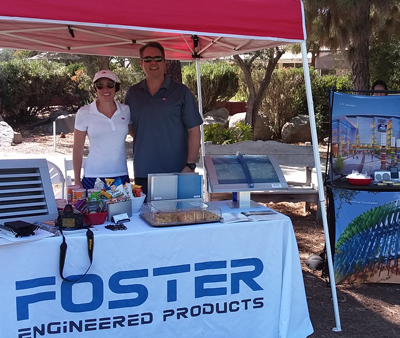Bob Foster is not easily dissuaded from his plans and dreams. That’s something that is quickly evident as he describes his initial approach to the world of being an independent manufacturers’ representative.
According to Foster who heads Foster Engineered Products, Phoenix, Arizona, “Years ago when I was the project engineer on a job site for a construction company, I was not familiar with reps or what a rep agency was. I was working the midnight shift on a hospital project and had to quickly rebuild some interior walls. I was given the contact information of the local representative of the interior wall protection manufacturer to contact. When he arrived on the job, I asked him what he did and his response was ‘I represent the manufacturer that manufactures all the wall and door protection you need for this project.’ It was at this moment I was exposed to the entire industry of manufacturers’ representatives.
“I was fascinated by this industry and asked a million questions, subsequently, we learned that I attended the same high school as his daughter. As I progressed through various positions with my company, I always called him for assistance. A turning point in my career led me to call him and let him know that I was interested in what he did for a living. I asked if there was any room in his agency and if he had a succession plan. I was young and naive enough and explained I would like to partner with him and eventually take over his agency. His response was ‘You’re too young, too dumb and I don’t want to share my money with you.’”
While that rebuff might have pointed the average businessperson in a different direction, not so Foster. “About a year later the company I was working for changed management and the way they went about business. Once again I approached that rep and let him know that I wanted in. I told him he’s got to have some sort of exit strategy for the business and thankfully this time he was ready.”
“Under Cover”
He continues that the plan was for Foster to work for him virtually “under cover,” without pay, and not even letting the agency’s principals know that there was a new man on board. “The plan was to covertly learn “the business” and use all the new business I brought in to buy out the ownership and take over in five years.
As that exit strategy plan evolved Foster admits that he had to travel two distinct learning curves — not to mention keeping in mind family challenges — before he was completely comfortable on the job.
Addressing the first curve, he says “I had put myself through college working in a lumber yard. I knew a lot about materials and always enjoyed being around construction. As a result, I wanted to be involved in the materials side of the business. I not only wanted to sell, but I also wanted to help customers get the materials installed. I had to learn more about the specification and sales side and concentrate less on the familiar installation side. I had to learn to work more closely with architects. I have to admit, it took me years to turn that ship around.”
The second learning curve was one that Agency Sales and MANA have long advised association membership about — the importance of learning to be a professional businessperson. According to Foster, “I had never owned a business and one of the first things I encountered was how to survive the often lengthy period that develops between the time you’ve been awarded a job or project and the time you’re finally paid for your work. I quickly learned that the cash-flow situation wasn’t like it was in general contracting where you submit your pay application and get paid. Now as a rep it could be months or even years before you’re compensated.”
As so many reps before him, Foster had to borrow from savings to cover that period of time.

Bob Foster, with Foster Engineered Products’ sales manager Jamie Benson, has learned to maximize down time at golf tournaments by sponsoring a hole (usually a par 3). “Instead of playing in a tournament we sponsor a hole so we can meet everyone. We set up the drink cart and games for the players to compete in. It’s a good way to take advantage of down time and have some fun.”
Family Considerations
Then, as already mentioned, there were the family considerations. “When we made the decision to buy out the rep agency, my wife Jennifer knew what was coming down the pike. She was in upper management with another company, several months pregnant and we were remodeling a 1950’s home, taking everything right down to the studs.”
Foster continued, “We were fortunate in that we’re both realists and knew what had to be done to make our decision work. One of the first things I did was to hire a person to help me pick up, deliver and review plans. This person is still with me and heads up my interior products. Jen worked for her company for two more years keeping our benefits and some stability in our life. After two years I was growing the company and needed to accelerate buying out the ownership. Jen and I decided to put all our eggs in one basket and have her resign from her company and take over the administration of our company. We thought this would provide more autonomy for our growing family (we both laugh at that now).
In order to make that work and to keep the business and family concerns separate, Foster explains, “One of the first things we did was sit down and actually draw up a contract on how things were going to work. During the business day, it was agreed that decisions had to be made by one person. After the work day, we’d go home and change the relationship to strictly husband and wife.”
Proof that the arrangement has worked is the fact that the agency, incorporated in 2002 with the purpose of representing material manufacturers in the architectural and construction industry, has grown to represent leading manufacturers in Arizona, San Diego, and Las Vegas.
Since Foster already admitted he entered the rep profession without a great deal of preparation, he says for the agency to get to and occupy the position it has today necessitated a “bit of a baptism by fire.” Foster explains that “My father-in-law has a saying, ‘Education is expensive no matter how you get it.’ That’s exactly what we went through. Along the way we made our share of mistakes including buying a building and a warehouse (both of which have been sold), but thankfully we’ve learned from our mistakes and prospered.
“Early on I had an incredible CPA who mentored me through the process of buying the business and teaching me about the importance of cash flow and properly managing personal finances. If not for him, we wouldn’t be as successful as we are today.”
Bid Track Sell to the Rescue
Foster was asked if over the period of time that he’s owned Foster Engineered Products there have been any appreciable changes in his day-to-day job as a rep. In answer he was quick to note that in 2002, “When we started, everything we did was paper and file based. We had a big table filled with bid sheets. We looked at plans on film reels and hired a person to drive those plans for shipment via FedEx every day. I had a FedEx bill of $300-$400 every week. Add to that, for a good seven years or so, we were in one of the worst economies in the nation. I’d sit in the office and the phone wasn’t ringing and we weren’t receiving any e-mails. Everything was dead.
“In that silence I realized if we didn’t change the way we were doing business, we weren’t going to be around this time next year. We had piles of files filled with quotes from each month that were too overwhelming to sort and follow up. Our paper and file system was a “passive system.” It was then that I wrote out a program that would be a “proactive system” a CRM program — Bid Track Sell, LLC
(www.bidtracksell.com) — that changed everything for us.” (In the “RepTech” department of this issue of Agency Sales magazine Foster details many of his thoughts on the importance of CRM programs for independent manufacturers’ reps.)
In an article that appeared in the Phoenix Business Journal earlier this year, the newspaper reported that the Bid Track Sell program, which resides on Salesforce “…captures project data and contact information in a central location to save manufacturer reps(sic) hours a day.”
He continues that the CRM program “has been a huge part of the success of our agency. What it did was to create a better way of conducting business. It has served as my edge vs. everyone else.”
MANA welcomes your comments on this article. Write to us at [email protected].


